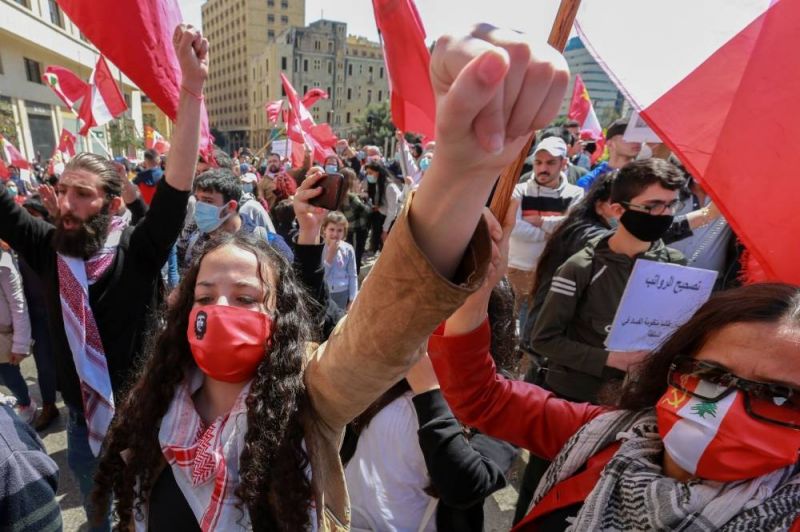
Demonstrators take part in a protest against mounting economic hardships in Beirut on Sunday. (Credit: Aziz Taher/Reuters)
Want to get the Morning Brief by email? Click here to sign up.
Lebanon again eases its COVID-19 lockdown today, pushing back curfew and extending opening hours at restaurants, cafes and retail stores till 9 p.m. It will be the most relaxed set of measures in place since the country entered a strict lockdown in January to curb an alarming surge of infection rates after the holidays. With an average of more than 3,000 new cases detected per day, however, the situation remains precarious — the caretaker premier warned Friday of a potential third wave. Despite the dangers, without a strong social safety net, opening back up had become all but inevitable for those who rely on daily wages to survive.
Those aged between 55 and 65 will start receiving the AstraZeneca coronavirus vaccine under the Health Ministry program today, according to Firass Abiad, the general manager of Rafik Hariri University Hospital. The first batch of COVID-19 vaccines from AstraZeneca arrived in Beirut last week in a much-needed boost to Lebanon’s sluggish inoculation campaign. The initial batch comprised 33,600 doses — enough to vaccinate 16,800 people. This is expected to allow the Health Ministry to add new priority groups, including teachers and workers in productive sectors, to the vaccination rollout starting in April. Fewer than 200,000 inoculations have been administered since authorities launched the vaccination program in February.
Sporadic protests continued over the weekend as hundreds of demonstrators gathered near the Presidential Palace in Baabda on Saturday, protesting deteriorating living conditions and demanding accountability for the Aug. 4 Beirut port explosion. Dozens of protesters also marched from Banque du Liban in Hamra toward the Economy Ministry in downtown Beirut on Sunday, blocking traffic in the area. Lebanon’s currency has lost almost 90 percent if its value and many basic household items have become unaffordable for residents without access to dollars.
The lead investigator in the Beirut port explosion probe is expected to question Customs chief Badri Daher today, a judicial source told L’Orient Today. Last week, Judge Tarek Bitar questioned others who have been detained for over seven months in relation to the blast without knowing the charges against them. Bitar was appointed to run the probe after his predecessor was dismissed on Feb. 18. While Bitar’s investigation remains largely secretive, reports indicate he is focussing more than his predecessor did on investigating the source of the ammonium nitrate explosive and is yet to decide how to proceed in relation to Fadi Sawwan’s charges of negligence against current and former ministers and the caretaker premier.
Parliament is set to hold a legislative session at 11 a.m. today with only two items on the agenda. Parliament Speaker Nabih Berri summoned MPs to a plenary session — the second this month — to vote on a $200 million advance payment to EDL to import fuel for power generation and a draft law that aims to recover funds and assets illegally obtained through corruption. However, even if passed, this law depends on the activation of the National Anti-Corruption Commission, a body whose members have never been appointed.